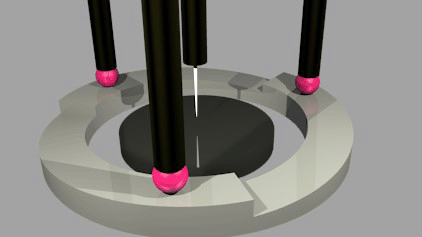Variable-Temperature STM
Catalytic reactions consist of series of basic steps, such as the dissociation of molecules and the surface diffusion of adsorbed molecular fragments. STM can give direct, atomic scale access to these steps, but an experimental problem has to be solved: Because of the significant span of activation energies of these processes the experiments have to cover wide ranges of temperatures, a problem for STM with its known sensitivity to thermal drift. We have built a variable-temperature STM of the so-called beetle-type that operates at temperatures between 50 and 500 K and is used for such experiments.

Figure: Approach mechanism of the beetle-type STM. The special geometry of this setup makes it relatively stable with respect to temperature changes.